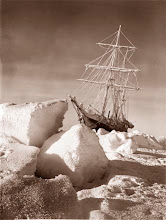(As published in The Kansas City Star:)
The rest of the world might consider life there a banishment, might think the place is some frozen gulag to be endured.
But Brack relished his sunless winter at the bottom of the world. He tended a greenhouse, learned to play guitar, picked up conversational Italian. Venturing out of the Amundsen-Scott station meant dressing like an astronaut, but it promised the mind-blowing colors of the aurora australis.
Brack is part of a breed that has been drawn to Antarctica for better than a century — men and women intrigued more by the exotic than the easy, who think life is too short to be squandered in someplace ordinary.
Working all three U.S. research stations on the continent, Brack never went hungry or lacked a warm bed and an Internet connection.
At 22, he set aside a business degree and went to work as an Antarctic chef. Raytheon — the giant defense contractor that also runs the American polar research stations — started him at a field camp about eight miles from McMurdo Station on the Ross Ice Shelf on the continent’s New Zealand side.
MacTown, as regulars call it, is a summertime home for about 1,000 people — in winter, a fifth of that. Typically, about half the people are researchers. The rest are people such as Brack, who keep the scientists warm, fed, healthy and free to pursue research.
During that first season he tried yoga. He joined a bowling league. In an adaptation of “Much Ado About Nothing” he transformed the role of the village idiot into that of McMurdo’s safety officer.
“McMurdo is a mining town crossed with a fraternity,” Brack said. “You see lots of people who had divorced or left their families and their careers, people just looking to get away. The South Pole” — where he would work in subsequent years — “had some of that, but more people who were eager to be there.”
He regularly banked his Raytheon pay and traveled the world between seasons. His passport has been stamped in more than 50 countries.
Brack spent two stints at the pole, one for a full year.
It’s brutal enough in the summer — “the cold sucks your breath away the instant you step off that plane” — but winter is another story entirely. Temperatures regularly drop to minus-90 degrees Fahrenheit, and the sun disappears from March through September.
“Approximately 5 percent of winter-over personnel experience symptoms that fulfill criteria for a psychiatric disorder,” concluded one social scientist. “Even among those who fail to meet (those) diagnostic criteria, (Antarctica) tends to magnify seemingly trivial events and symptoms.”
That’s why everyone who wants to winter on the ice must first see a shrink.
“ ‘Do you love your mother?’ ‘Do you want to kill your mother?’ You know the kind of stuff they’re looking for,” Brack recalls of his exam. “The psychiatrist went over the results and said something like ‘This would be a problem if you were anywhere else in the world, but it’s good for the South Pole.’ Something,” Brack laughs, “about commitment.”
Some South Pole realities set in quickly. Consider the dating scene. Of the 58 people at the pole that winter, just 11 were women. Of those, six had come with husbands or boyfriends. Of the remainder, one was lesbian and three paired up with somebody in a matter of days.
“There were of a couple of us guys sitting around doing the math and saying, ‘Well, that settles our chances for the season,’ ” Brack said.
He made a point to go to the bar only about once a week. He played cards, tended his greenhouse herbs and lettuce, and mixed with scientists whenever he could.
“Some people really enjoy it,” he said. “Others just drink.”
One guy downed a bottle of Crown Royal every night. He’d take the purple velvet bags the whiskey came in and hang them on the fluorescent light over the bar. By winter’s end, the light was blotted out entirely.
“Generally, he was a happy person,” Brack said. “There definitely were others who were more destructively depressed.”
Yet the cold and the company get old for everyone by the end.
“It’s at the point where all the stories have been told five times,” Brack said. “You know all the buttons to push on everybody, and you’ve even pushed a few yourself.”
He’s spent the last two years at the Palmer Station, which sits on Anvers Island just off the Antarctic Peninsula, almost halfway between the South Pole and the tip of South America. It’s the smallest of the U.S. Antarctic outposts — its population runs from about 30 to 45.
“It’s a commune here,” he said, “not just a labor camp.”
It also offers the most inviting environment. The temperature barely dips below freezing and often lingers in the 40s. The place has a bar, a small movie lounge, a fully outfitted gym, a sauna, an open-air hot tub, wireless Internet and some of the best eating on any continent.
Here the 31-year-old Brack is a jack of all trades, handling cargo, acting as fire marshal, working on the ocean rescue team, doing occasional kitchen cleanup, raising the flag and playing bass in the house band.
Brack revels in it: the scenery, the people, the ability to hop into a boat for a photo safari. But in this second season at Palmer and his fifth inAntarctica, he says the end is near. Every romance he’s had in civilization has been cut short by a trip to the ice. And someday he might like a family.
“I’m enjoying this while I can,” he said. “How many places can you work and while you’re having breakfast you look outside the window and see penguins or whales? It’s great here.”




No comments:
Post a Comment